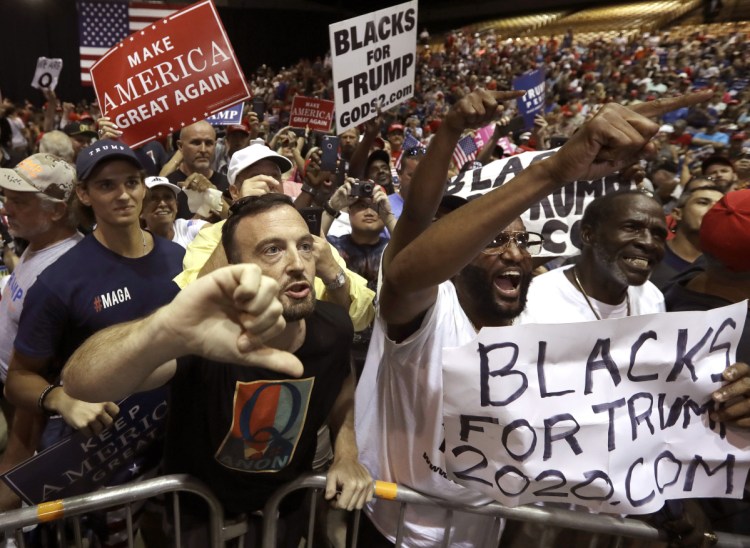PENOBSCOT — When I was young, we lived in Chicago, where my father was bureau chief for a national newspaper. It wasn’t called “the media” then – just “newspapers.” There was print, radio and television at the time, and there certainly wasn’t the phrase “fake news.” It was not long after Edward R. Murrow’s heyday, in the Walter Cronkite-David Brinkley era. My father was the figurative scion of their tenor, stature and character.
As I watched the recent coverage of President Trump’s rally in Wilkes-Barre, Pennsylvania, I think I heard the echo of an ancient voice and rabid dog whistle. The press was being accosted for news gathering, spit on, reviled, the object of obscene gestures and verbal baiting. Could I be witnessing the very strain of bigotry that my father contended with as a reporter and explained to his kids?
Dad covered the Southern states at the height of the civil rights movement and the marches and demonstrations going on in cities like Selma, Birmingham and Montgomery. He’d fly off for two weeks at a time with his Olivetti typewriter and suitcase, filing news stories from Western Union offices wherever the action was at the time.
It wasn’t until many years later, in snippets of conversation about his reporting years (he went on to be American news editor, then a foreign correspondent), that he would gloss over the exact newspaper-reporter strategies required to get the story. Like flying into adjacent states to rent a car with Southern license plates. No sense attracting attention to the white Northern press coming to Dixie to ask questions.
And he said that he and his fellow correspondents would travel together – two by two, not alone – so as not to present too easy a target for the subjects of many stories: the police, mayors, campus officials, et al., who were part of his interviews and coverage. They did not necessarily want their story told. It was called “news gathering,” and he’d trained at one of the premier journalism schools in the country.
Presumably, he did not feel threatened by the other subjects of his news gathering: the black citizens, clergy, civil rights activists and community leaders. They wanted the story told. It was in the interest of their civil rights to have the granularity of their lives relayed to a larger audience.
Dad was good at his job. He went to street level to ask the right questions of the right sources, obtain varied and balancing points of view, write coverage that sought to reveal solutions as well as problems – the antithesis of yellow journalism and sensationalism. His press assignment was to be the friend of humanity, certainly not “the enemy of the people,” the abhorrent fascist phrase enjoying a resurgence.
And yet, hatred, prejudice, segregation and all the forces trying to claw back progress toward diversity rear their hydra head to resist the uncovering of truth, compassion, empathy and benevolence. I might say that the intensity of the conflict suggests ripeness for the destruction of the tribal adhesions that thwart societal progress. Or do I sound too much like a coastal elite? I don’t see civility and democratic norms as either “coastal” or “elite.”
Furthermore, there is an asymmetry to the president’s defense of constitutional rights. There is no questioning of the mission of the armed forces and law enforcement to protect the citizenry, but the truth enforcement guaranteed by the Constitution’s protection of the press is labeled as suspect – or even “the enemy of the people.” That’s not right. The defense of Americans’ intellectual rights is of equal value to the defense of their physical and property rights. It is, in fact, another border wall: restricting or blocking honest inquiry and freedom of ideas and discourse. No false equivalency need apply. Journalists, too, protect the citizenry.
I don’t wish to condescend. I simply channel my father’s experience and his aspiration. This seems to be a critical juncture in one small part of the national conversation about the role of reporting the news – a moment to turn back from violence, and from taking outrage and hatred to a new level. Newspaper writers should not need to travel in pairs for safety, literally or figuratively. That sounds more like war correspondents, not domestic news gatherers.
At least in this day and age, with the 24-7 news cycle and the pervasiveness of spontaneous video and audio recording, no one can say they were not warned, that they did not see in the faces of the crowd the warnings that this wave of spite must be turned back. It means that we are fellow correspondents, witnesses to intimidation and potential violence. We need not be doomed to repeat the abuses of a bygone era. But it is about to be too late.
Send questions/comments to the editors.



Comments are no longer available on this story